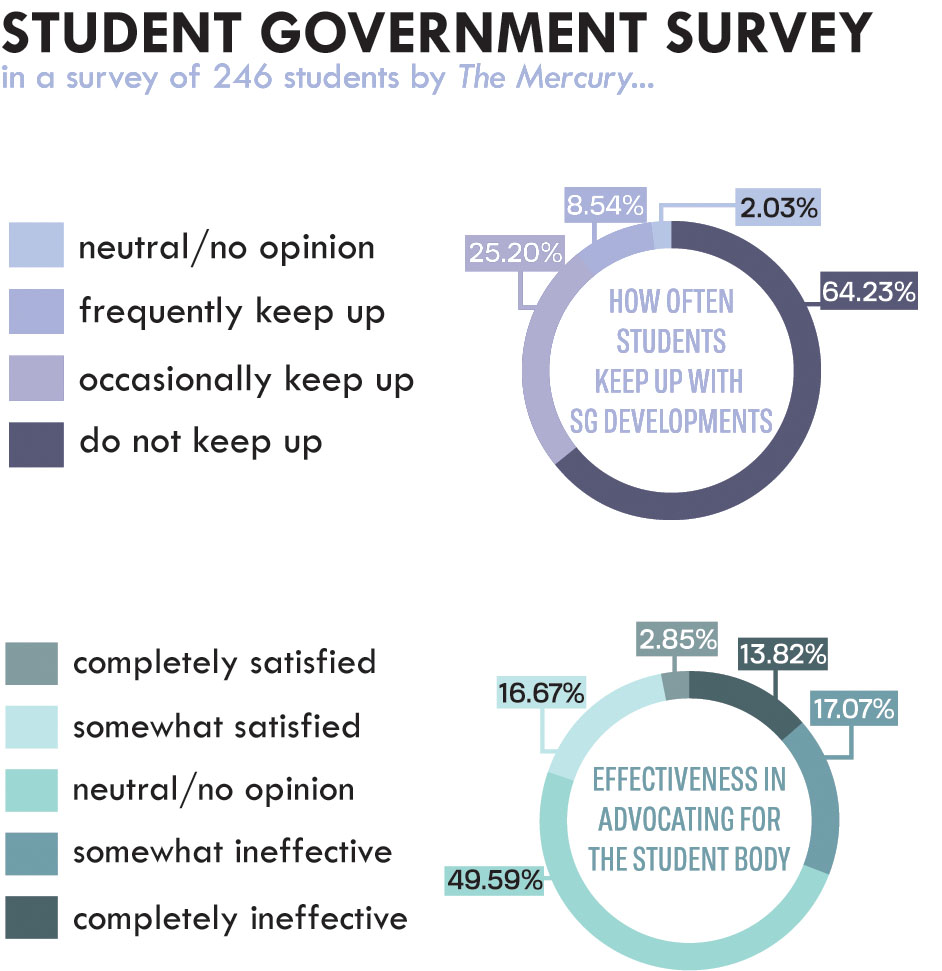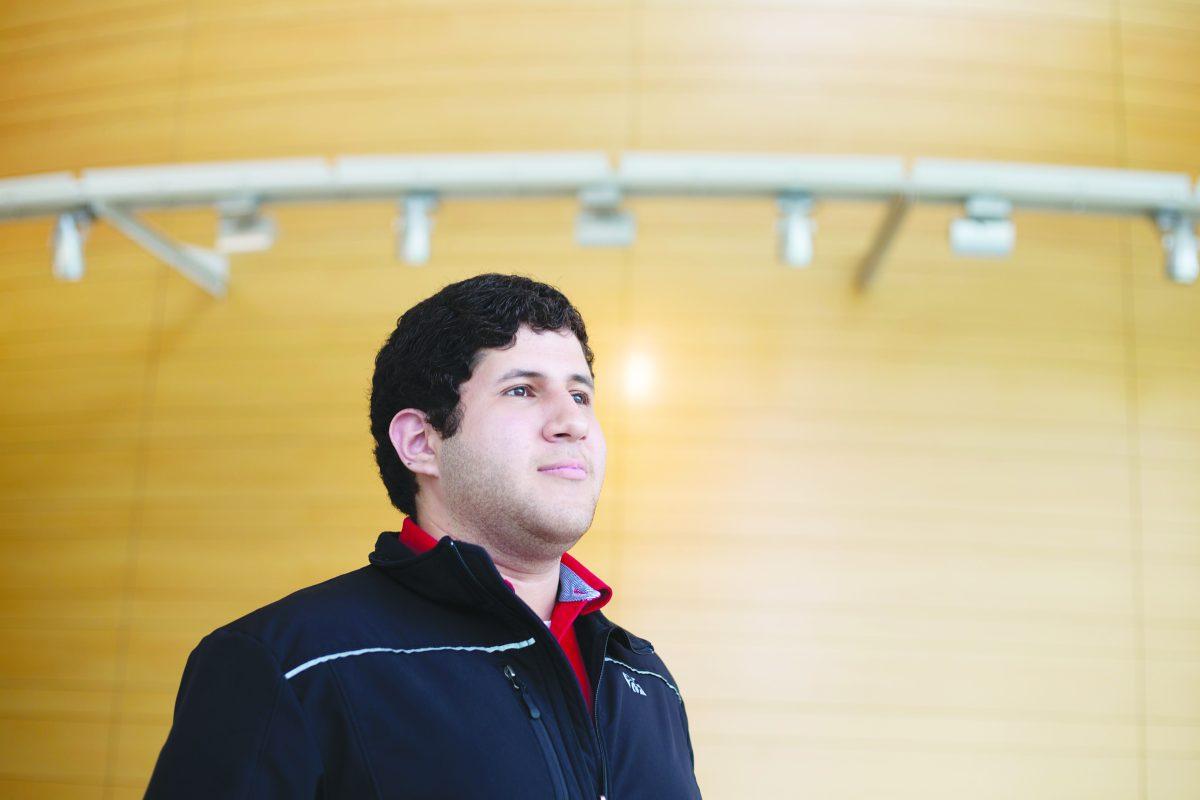As the new Student Government leadership prepares to take office, the outgoing administration reflected on its ongoing efforts to improve student engagement and represent student interests in a year that saw UTD in national and local headlines in the wake of several high-profile scandals.
Outgoing President Eric Chen said that student involvement independent of SG played an important role this year in shaping change at UTD. Chen cited the Jacob Anderson scandal, in which a former Baylor University student accused of sexual assault transferred to UTD, and the allegations against Chartwells’ labor practices.

As of the latest SG election, one such student is no longer outside Student Government, but will now lead it. Political science junior and former Chartwells worker Ayoub Mohammed was elected as next year’s Student Government president. Mohammed won with a 14-point margin against neuroscience senior and current SG senator Danni Yang.
Mohammed’s Labor ticket ran on a platform emphasizing the rights of student workers. The ticket was also vocal in criticizing current SG practices. After a run-off, Labor won seats for all but one of its 10 candidates.
“I’ve heard that the problem with past (SG) administrations is that they’re kind of scared to maybe bug the (university) administration because they don’t want to burn the bridges that hold those relationships together,” Mohammed said. “Maybe they don’t want to press too hard on the administration, I guess, because they see them as superiors. I think I’m different from past (SG) administrations. I can be annoying. I can bother the administration. I want to get answers and actually convey them to the students.”
Mohammed said students’ political apathy was a major concern, which he hopes to remedy by taking a more proactive stance to issues.
“Student Government will hold all these town halls and all these meetings — like meet your senator (or) meet your president but students don’t know about it because they don’t get any visibility…why should students go to Student Government? Why shouldn’t Student Government go to them?”
In a poll of 246 students conducted by The Mercury, 64.23% of polled students said that they did not keep up with Student Government developments at all. Nearly 50% of polled students were neutral about the efficacy of Student Government advocating for students in the last year, whereas 30.89% felt Student Government was ineffective. Only seven students polled said that they were “completely satisfied.”
Mohammed said he thinks the reason so many students have no opinion on the efficacy of the current SG is because they don’t know it exists.
“If they actually knew what Student Government was, I’m pretty sure that would lean way towards ‘ineffective’ because those people don’t know Student Government exists,” Mohammed said. “But if they did know it exists, they probably would think it does nothing.”
Outgoing Vice President Carla Ramazan said that student apathy has been a long-standing challenge for SG.
“Obviously it’s difficult when you have such a diverse student body,” Ramazan said. “It’s difficult to go about things in such a way that all 26,000 students know that you’re here and what it is that you do.”
Ramazan said in this past year, SG continued a number of marketing measures and events designed to increase visibility.
“We have these initiatives where we ask students to come and engage with us, we put it on Facebook and Instagram and Twitter, we put posters throughout the school,” Ramazan said. “When you’re on the outside of something, it’s really difficult to understand how behind the scenes works and the efforts that are going on our end so I would just encourage those students to maybe put themselves in our shoes and come out and talk to us, like ask us what it is that we’re doing.”
Chen echoed Ramazan’s sentiments but said SG could do better in engaging students and meeting them halfway.
“In the past, we’ve kind of defaulted to saying like, ‘Oh, they can come to our meetings, they’re open.’ And I think that’s a tremendous avenue but I think there’s also something to be desired from Student Government creating a more frequent, more accessible meeting.,” Chen said. “It’s not (students’) responsibility to come and educate themselves about our organization. I think it’s definitely a two-way street … we do kind of have the stronger onus there.”
Chen said that SG presidents and vice presidents have always had to navigate the line between maintaining relationships with administration and representing the wishes of the student body.
“We’re kind of ambassadors for Student Government and students in general to some of these administrators so it’s important that we maintain good relationships with them,” Chen said. “But there are definitely times that UTD grows so quickly and change happens very quickly, which is a good thing, but … there’s always that risk of decisions being made or things happening on the administrative side that just simply don’t make it to the students.”
For SG veteran and political science graduate student, Adam Richards, Student Government hasn’t always managed to maintain balance in favor of students.
“There’s a cultural reticence to go against administration’s wishes. This has been a running theme on Student Government as long as I’ve been there,” Richards said. “That has a chilling effect on people’s speech.”
Richards resigned his position as senator in January after almost four years serving on Student Government during both his undergraduate and graduate degrees. Richards cited frustration with SG’s unwillingness to take a stance in the aftermath of the Jacob Anderson scandal as a major reason for his resignation.
“This is not how I saw my last semester going. I love my job at Student Government, you can ask pretty much anyone who worked with me,” Richards said. “But as a survivor of sexual abuse, I just didn’t feel safe and that’s why I left.”
Student Government released a statement acknowledging the Jacob Anderson controversy, but ultimately did not take any direct legislative action on the case. Chen said he recognized students’ disappointment.
“I think that the outcome wasn’t super desirable for a lot of students. But again, I think it was an important time for SG to engage with the student body in that way,” Chen said. “It gave students an opportunity to take a look at SG and say, ‘Oh, is Student Government representing our interests in the way we want it to and if it’s not, how can we be a part of the process to improve some of those procedures?’”
In the aftermath of the Jacob Anderson controversy, many students organized behind efforts independent of SG, including a protest group and a petition. Richards said he saw this as evidence that SG was not well equipped to deal with large issues in its current state.
“It’s always like, ‘How much is this going to inconvenience the administration?’” Richards said. “(But) if SG doesn’t get involved in those kinds of issues, what the hell does it get involved in? What’s it going to spend its political capital on?”
Incoming vice president Hope Cory, who previously served as a senator before her election as VP, said that going forward, the decision to “spend” political capital will differ on a case-by-case basis.
“Each situation is going to differ, but we’re here to represent students in whichever way that it is,” Cory said. “It’s going to be hard to hear (pushback from administration) but Ayoub and I are both … going to fight for what we believe in.”
Biochemistry senior Joseph Campain has served on SG for four years, including one year as vice president. Most recently, he’s served as a committee chair. Campain said SG doesn’t play the role some students might expect.
“It’s not supposed to be an incredibly powerful body that is always changing policy at the university. It’s supposed to be essentially a pipeline from students to the administration to give feedback,” Campain said. “Ultimately, (SG) is something that’s not supposed to be empowered to change any segment of the university that we find is broken.”
SG has a limited amount of resources, especially when it comes to sway with administrators — and in the past, SG has decided that non-actionable items, such as resolutions, weren’t always worth the time and effort, Campain said.
“That’s part of the problem we face. If we start condemning major problems on campus before trying to solve them, people aren’t going to take us seriously anymore,” Campain said.
Cory served in student body president and VP roles at other institutions before transferring to UTD. She highlighted a case at a previous college in which she was able to take a stance against President Trump’s move to phase out the Deferred Action for Childhood Arrivals program.
“We got all this information from students and drafted this resolution that said we as a student government support all students including undocumented and DACA students,” Cory said.
The 2019 Student Government election was the first after a set of election reforms last year. Previously, candidates for president and vice president were required to first serve one semester as a senator.
“Being able to increase the diversity of people who get elected … would do a lot,” Richards said. “By effectively opening up Student Government to criticism, you’re also opening up administrators to criticism.”
This is Mohammed’s first position in Student Government, but he said he’s already begun informally meeting with students, organizations and resource centers on campus to assess their needs and to try and engage them.
He said he’s not afraid to take a hard stance and disagree with university administrators if necessary.
“As president, I know I have to be careful with what I say — or don’t say,” Mohammed said. “I don’t want to make the administration angry. But I’m going to push on it. I’m not just going to sit in some meeting and talk all nice.”
Additional reporting by Bhargav Arimilli and Emaan Bangash

















